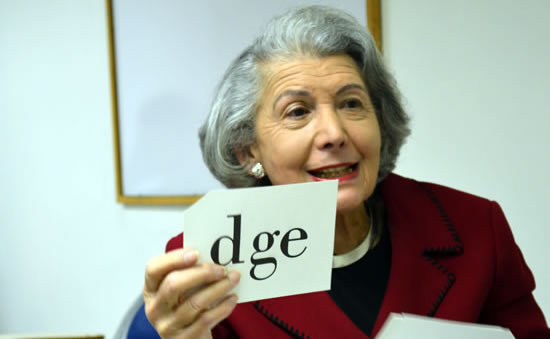Exclusive Interview with Sandra Priest Rose of the Reading Reform Foundation
By Jasmine Bager

“Language can be made fascinating,” says Sandra Priest Rose, the well-respected veteran educator and philanthropist. She has been actively training young students and teachers for the past few decades. For the last 32 years, Priest Rose has been involved in the not-for-profit literacy organization, Reading Reform Foundation of New York (RRF), which she founded. The RRF creates tools to help teachers learn how to better teach. It is a program, “by teachers for teachers,” she says. In 1963, Priest Rose took a Spalding course in Peterborough, NH, which served as one of her early inspirations. Since then, her organization has benefited over 30,000 students from the RRF methodology.
The teaching consultants that she trains work with public elementary school teachers from NYC and the surrounding areas. The program is in place to boost reading for students in K-3 classrooms. They meet 60 times over the course of one academic year, providing trainees with information on how to teach reading, writing and spelling, using RRF’s multisensory approach. The approach has been heavily influenced by the Spalding method, which is an instruction that is “explicit, systematic, interactive, diagnostic and multisensory.” The method is helpful in improving student understanding of text structure, fluency, reading comprehension, grammar and high-frequency vocabulary. It has also been helpful to those with learning disabilities and those who are learning English as a second language.
Once a teacher has been trained in areas such as phonemic awareness and fluency, that teacher then translates this information to their students by helping them see, hear and write what they are learning, simultaneously. Students are taught to examine words for their roots and meanings using flashcards and other methods which allows for more thoughtful reading and understanding. The result has been successful. With raised test scores, students have gained confidence and the ability to excel in learning. Funding is mostly from contributions and each school pays a small fee.
Over 1,600 New York City students are currently thriving from the program and 64 teachers are receiving the Reading Reform training in 16 NYC schools in four boroughs, and in one school in Port Chester, NY. At this time, 300 teachers are taking Reading Reform courses and 1,200 teachers have been part of the in-school teacher-training program. More than 20,000 teachers attended the annual conference.
Some students catch on to reading so quickly that it appears effortless, but it often narrows down to who their first teachers were and the curriculum at their schools. Functionally illiterate or illiterate adults routinely apply the lessons learned from the scientific findings in the classrooms. Elementary classrooms must incorporate certain research-based practices, she says, including early identification of children at risk of reading failure. Daily training in linguistic and oral skills helps to build awareness of speech sounds, or phonemes, she says. Explicit instruction in letter sounds, syllables, and words, accompanied by explicit instruction in spelling is also implemented. Teaching phonics in the sequence that research has found, leads to the least amount of confusion, her findings states. This is instead of teaching phonics in a scattered fashion and only when children encounter difficulty. Practicing skills to the point of automaticity is the goal, so that children do not think about sounding out a word when they need to focus on the meaning. It also means building vocabulary knowledge through reading aloud and discussing, as well as writing about quality children’s literature and nonfiction topics. Frequent assessments and instructional adjustments need to be in place in order to make sure that children are making steady progress. Regardless of social class, race or income, roughly a third of all kindergarteners require this explicit, systematic approach to learn how to read, Priest Rose says. Over the last few decades, scientists have set out to persuade educators and policymakers of the significance of these findings. The National Council on Teacher Quality (NCTQ) examined what current aspiring elementary school candidates in teaching are learning about reading instruction. They examined a random sample of teacher certifications that cater to schools of all types and concluded that five components of effective reading instruction are: phonemic awareness, phonics, fluency, vocabulary, and comprehension, according to the research by the National Reading Panel report, released in 2000. The RRF believes that schools would have better classroom successes if course materials better addressed each of these five components. Balanced approaches often still ignore the science of reading. National accreditation does not automatically equal adequate learning for teachers. Many reading teachers and textbooks describe the process of becoming a reader, as a natural, organic process. Many courses indicate that exposure to literature sparks a natural development of reading skill. Each teacher should still personalize the class and tailor it to his/her needs and that of the students. Often teachers, make too few demands and have low expectations of certain students, and emphasize fun rather than learning. Their quality of reading textbooks is poor and their content includes little or no hard science. Another issue is fragmentation in the field of reading instruction. States need to develop strong reading standards and licensing tests based on those standards. While 29 states require reading courses, many do not implement what their trained educators should teach and how. Standardized tests create an effective system of accountability for both education schools and teacher standards. Better textbooks and legitimate experts in the field must develop and write better reading textbooks.
Priest Rose says that students must learn to sit up straight and use a pencil. This way, they can truly learn so that they can teach. “Lead the kids to great literature and learning. The intellectual journey is the right of every child,” she concludes. #
For more information, visit their website (www.ReadingReformNY.org).
